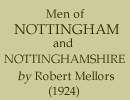< Previous | Contents | Next >
STATESMEN and M.P's.
SIR THOMAS REMPSTON, (d. 1406), was Lord of Bingham, and five other parishes. He represented the county in five Parliaments, 1381-98. He was Admiral of the Fleet, Constable of the Tower of London, and Knight of the Garter; a Conservator of the truce with France in 1401, which was renewed four times. He concluded a treaty of peace with France, and had other missions and commissions to that country. The House of Commons commended his services, and he was made a member of the Privy Council. In crossing the Thames into Essex, he was captured by a band of French pirates, and was probably ransomed; but in crossing in a boat from Paul's Wharf to the Tower he was drowned. The tide was running fast, the boatmen—because of the danger—hesitated; he threatened them, they yielded, but in attempting to shoot the bridge the boat ran against one of the piles, and Sir Thomas fell overboard. The body was recovered and buried in Bingham Church. (Art. W. H. Stevenson).
RALPH, LORD CROMWELL, who died in 1456-7, was the tenth and last in succession bearing the name of Ralph. He was born at the old Manor House at Lambley, which stood where the Rectory now stands. The moat of the manor house is still visible, and the traces of the fish-ponds, and a large yew, three and a half yards in circumference, tell the tale of departed dignity. The title of Cromwell was taken from the village of that name, five and a half miles North of Newark, where the family also had a manor house, near to where the Romans had a bridge across the Trent. It is worthy of note that in Domesday Book (1086) under the head of "The land of the Thegns," that is, of the King's Servants, the particulars of the Manor of Lambley immediately follow those of Cromwell.
We have no information as to the early days and education of Ralph. As a soldier, he accompanied the King in his wars. In 1418 he was made a lieutenant to the King's brother, and acted as his deputy. When he was twenty-six years of age the King appointed him to the important post of Governor of the King and Queen of France. In 1422, Parliament appointed him a trier of petitions to Parliament, and when he was twenty-eight years of age the Lords elected him as one of seventeen members of a Council to rule the nation during the King's minority. He had other appointments, the most important of which was that of Treasurer of the Kingdom, (1433) in which he displayed great capacity and energy. He was evidently proud of his post, for a purse is the symbol he had put upon all his buildings. When he travelled he was accompanied by a great escort. In 1445 he became Constable of Nottingham Castle and Warden of Sherwood Forest. He was a great builder, and rebuilt Tattershall Castle, and built its church. He commenced to build Wingfield Manor and built its church, and other churches and buildings were erected by him. In a codicil to his will he directed that Lamb-ley Church should be rebuilt at the cost of his estate, and made bequests for monasteries, bridges, poor tenants, etc. (W. H. Stevenson and H. Gill).
Many Cromwells—not of the family—settled in North Nottinghamshire. The ancestors of Thomas Cromwell ("the hammer of the monks") went from Nottinghamshire to Essex. One of Oliver Cromwell's ancestors, named Williams, married one of Thomas Cromwell's descendants, and took her name.
SIR GEOFFREY FENTON, (1539-1608), translator, statesman, was the son of Henry Fenton, of Fenton, Sturton-le-Steeple. Judging by results, he must have applied himself thoroughly to his studies, and especially to the acquisition of a knowledge of foreign languages. In 1567, then residing in Paris, he published a translation of a collection of novels, and in 1577 he issued "Golden Epistles," being selections from Latin, French, and Italian, and later a translation from the French of a "History of the Wars in Italy."
In 1580 he received an appointment in Ireland, and took an active part in its governmental administration. He married the daughter of an ex-Lord Chancellor. He became the Principal Secretary for Ireland, was sworn in to the Privy Council, reported in person to the Queen as to the state of affairs, and gave counsel as to the policy to be pursued. He was knighted for his services, for he laboured with zeal and ability to promote the public good.
In a letter to Lord Burleigh, 28th October, 1588, after the dispersion of the Spanish Armada, he says that in a walk of less than five miles on the coast of Sligo, he himself had counted about eleven hundred corpses of men which the sea had driven ashore, and the like were to be seen at other places. (Brown).
He died in Dublin, and was buried in St. Patrick's Cathedral.
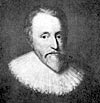
Sir Edwin Sandys (1561-1626)
SIR EDWIN SANDYS, (1561-1629), was about fifteen years of age when his father was appointed Archbishop of York, an office he held for twelve years, and as the father frequently resided at Southwell, and died there, the son would probably be a visitor there, or at Scrooby, where a part of the church property was leased to him. He became a very useful man in several respects:— (1) He aided the judicious Bishop Hooper in his great work of the "Laws of Ecclesiastical Polity." (2) As a member of Parliament he resisted the unconstitutional ways of King James I., and (3) he aided the development of the Colonial policy, which had so mighty a result.
SIR THOMAS HUTCHINSON, Knight., (d. 1643, aged fifty-five) removed from Cropwell to Owthorpe, and became a magistrate, administering justice, Mrs. Hutchinson in her "Memoirs" says, "with such equitee and wisdome, and was such a defender of the countrie's interest, that without affecting it at all he grew the most popular and most belov'd man in the country . . . . . being still sought by the whole county to be their representative (in Parliament) to which he was several times elected,'' thus in 1625-39-40. He appears to have been a man of great prudence. He removed from Owthorpe to Nottingham, some authorities say, to the house where the Judge's Lodgings have been, but what is more likely is that the house stood to the east of the carriage way leading to the rear of the County Hall. His library at Owthorpe "contained a vast number of folio volumes of polemical divinity," (Rev. Julius Hutchinson) for divinity as a science was a study then in vogue.
EDWARD WHALLEY, (d. 1678), was one of the descendants of Richard Whallaye, esquire, of Kirketon Hall, whose fine tomb is in Screveton Church. His mother was the "Aunt Fanny" of Oliver Cromwell. He joined the Parliamentary Army in the Civil War; was present and acting as Major at the battle of Gainsborough, and at Naseby (1645) distinguished himself by defeating two divisions of the Royalists, for which he was made a Colonel. For what was called "a brilliant action," at Banbury, he, in 1647, received the thanks of Parliament, and £100, and in lieu of his salary (which he had not received) there was given to him the forfeited estate of Flawborough, near Staunton, which had been taken from, and later on was restored to, the Newcastle estate. He for a time had the guardianship of King Charles, at Hampton Court, but the King managed to escape from his care and custody. Whalley's signature to the death warrant of the King was the fourth in order, and the next after that of Cromwell. He was afterwards engaged in fighting in Scotland, and later was made Major-General over five Midland Counties. He represented Nottinghamshire in Parliament, and Cromwell made him one of his "Lords," but upon the Restoration he fled, for there was a reward of £100 offered for his apprehension, dead or alive. He went first to Switzerland, and afterwards to New England, and in various places lived in concealment with his son-in-law Goffe for more than fifteen years.
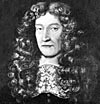
DENZIL HOLLES, (1598-1680), was born at Haughton, near Retford, and must be described first as M.P. and last as Lord Holles. His father, the Earl of Clare, (who lived partly in Nottingham, and to whom a gigantic tomb was erected in St. Mary's Church, where he was buried,) was strongly opposed to the arbitrary government of the King (Charles I.), and when the House of Commons wanted to pass certain resolutions, which the Speaker was afraid, if passed, would give offence to the King, Holles was one of the members who held the Speaker in his chair until the resolutions were passed, (1629). For this he was prosecuted, and the Court of King's Bench fined him 1,000 marks (?£666) and imprisonment in the Tower, where he remained about a year. In 1642 the King went to the House of Commons to demand the surrender of five members, Holles being one of them, whom he charged with high treason, but the members had fled, and the King departed very angry. In 1643, Holles signed the Solemn League and Covenant, and as one of the heads (if not the head) of the Presbyterian party, their separation from the Cromwellian party became more pronounced, and led to Holles withdrawing to France, where he remained until the Restoration, which he aided; for he had always sought for constitutional government. Parliament had voted him £5,000 towards the losses he had sustained in the Civil Wars, but he declined it. He became Ambassador to France, and was made a peer, and a member of the ministry under Charles II. There is a fine monument to his memory in Dorchester church, where he was buried. Bold and incorruptible, he sought his country's good.
The mansion at Haughton is no more; a farm house is all that survives; the park has become meadows and arable fields; the church is in ruins in a plantation of firs, with several mutilated tombs.
WILLIAM SACHEVERELL, (1638-1691), of Barton, represented Derbyshire in three Parliaments, and Nottinghamshire in the Parliament of 1690. The great walls round the house in which he lived at Barton still continue, and the brick dovecote, but the house is destroyed. He was described as "the ablest parliament man.'' He strenuously opposed the succession of James II. to the throne, on the ground of his popish tendencies, and thereby gave offence to Charles II. In the last years of that monarch a movement was promoted by the Court party to induce the boroughs to surrender their ancient charters guaranteeing their liberties to act in local administration, and in the new charters to insert clauses limiting their powers, and authorizing the government to intervene, and in effect to direct who was to be elected. This movement, William Sacheverell vigourously opposed. When the question of surrender came before the Nottingham Council, the votes were equal on each side, including the vote of the Mayor for surrender. It was a foregone conclusion, for the Mayor had in his. pocket the deed of surrender, to which he at once attached the Town Seal.
When the next election came, the new charter had not arrived, and William Sacheverell was put at the head of the opposition, and there was great excitement in the town, for the new charter arrived during the day containing all the objectionable clauses. Both parties elected a Mayor, to which there was, of course, opposition, and this was followed by the opposing party being indicted for having notoriously, unlawfully, and seditiously assembled with many other ill disposed persons to disturb the public peace. The case was heard before the notorious Judge Jeffreys, who abused and bullied all round, and gave a violent summing up, and the jury at midnight, locked up, yielded, and Mr. Sacheverell was fined 500 marks (£333 6s. 8d.), and other prominent Nottingham inhabitants were all fined lesser sums.
He died at Barton, and was buried at Morley, where the altar tomb records that he had "served his king and country with great honour and fidelity in several parliaments."
ROBERT SACHEVERELL, son of the above, was elected M.P. for Nottingham in 1698, and five times afterwards.
It is worth recording that Jeffreys died in the tower, lost and forsaken.
New charters were given by William and Mary, restoring the old charters, and cancelling the objectionable powers.
JOHN PLUMPTRE, (d. 1751), was a descendant of the worthy benefactor of the Hospital. In Deering's "History of Nottingham," (1751), there is an engraving showing an "East prospect of Nottingham taken from Sneinton Hill," and dedicated "to John Plumptre, Esq., one of the Honourable Members in Parliament," and the largest house shown thereon, standing on the North side of St. Mary's Church, is Mr. Plumptre's house, which appears to have been built by him in 1712-15, and continued until 1855, when it was pulled down. In the History referred to, Mr. Plumptre supplied to Dr. Deering much material to enable him to complete the work. He was a promoter of education among the poor, and in the Deed founding the Blue Coat Charity School in Weekday Cross, in 1720, his name stands first of the Trustees. He promoted the welfare of the Hospital, and it is recorded that " beside other great improvements, four new tenements were added by him in 1751, and his son added two more tenements in 1753." He appears to have been member for Nottingham in seven parliaments between 1705 and 1741. To his family was granted, in 1632, the north transept of St. Mary's Church to hear divine service, to pray and to bury there, and underneath a large vault contains ten members of the family.
THE BENTINCKS.
WILLIAM HENRY CAVENDISH BENTINCK, (1738-1809), the third Duke of Portland, succeeded to the title and estates when he was twenty-four years of age. One of his first appointments was Lord Chamberlain of the Household, and later he became Lord Lieutenant of Ireland, and in 1783, Prime Minister, with C. J. Fox and Lord North as Secretaries of State. He was also Chancellor of Oxford University, Knight of the Garter, Lord Lieutenant of Nottinghamshire, and held many other offices. In 1794 he accepted the office of Secretary of State, which he held for seven years. In 1807 he again became Prime Minister, and so continued for two years, when he resigned, and died. He is described by the "Dictionary of National Biography" as "a good administrator, tolerant in the exercise of great and extraordinary powers; careful in details, yet not wanting in broad administrative views. In private life he was in every way admirable." This testimony is the more important because in those days laxity in moral? was fashionable.
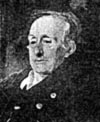
WILLIAM HENRY CAVENDISH SCOTT-BENTINCK, the fourth Duke of Portland, (1768-1854), although holding various state offices, and having state honours, was of a quiet, retiring disposition, and cared more for the development of natural resources among and by the people, than for doubtful improvements by acts of Parliament. Thus, in 1836-9 a Reservoir of 72 acres was made at Sutton-in-Ashfield, and thereby the water power for working the mills at Mansfield was improved, and works were constructed for irrigating the water meadows between Mansfield Woodhouse and Edwinstowe. Considerable developments were made by bringing into cultivation forest-land which had long before been deprived of its timber, and instead of growing bracken it was made to improve the national food supply.
About 1840 the Duke took steps to supply cottage garden allotments in the hosiery frame-work villages on the Portland estates. Thus at Hucknall, in each part of the parish a field or portion of a field was devoted, to the purpose, the Duke providing gates and fences, and paying rates. Mr. Bonser states that "in Sutton (where there are now about 1,000 of these allotments) the rental charged was 3/- per lot, but in the 1847 distress through unemployment and famine, 7 years rental was returned. These gardens were a Godsend to the poor, and in marked contrast to the state of affairs in some other parishes where the owners either refused to let land for the purpose, or charged three times the ordinary rental.
The Duke's portrait when he was 84 years of age was painted by Sir James Grant, R.A., and in December, 1852, was presented, nearly 800 of the Duke's tenants subscribing. An engraving was made by James Faed, and printed, showing a fine head and kindly face, and a dress having leathern breeches, as the tenants were accustomed to see the Duke when riding amongst them. Framed copies are still to be seen in many a farm house and are cherished.
LORD WILLIAM CAVENDISH BENTINCK,— (1774-1839), was second son of the third Duke of Portland, became in 1803 Governor of Madras, and so continued five years. He held the command of a division in Lord Wellington's Army, and afterwards was British Minister at Naples, and was Commander-in-Chief of the British Forces in that kingdom, and captured Genoa. He sat in Parliament for many years as member for Nottinghamshire and elsewhere. In 1827 he was appointed Governor-General of Bengal, and four years afterwards he became the first Governor-General of India, and there he did good service, for he followed a pacific and popular policy, in educating and employing the natives, developing local resources, and the overland route, suppressing suttee and thuggism, etc. Even after his return he again entered Parliament as M.P. for Glasgow.
LORD GEORGE BENTINCK, (1802-1848), third son of the fourth Duke of Portland, of whom a monument stands in Mansfield Market Place, for twenty years after he was elected M.P. for King's Lynn was so engrossed in racing that he paid little attention to public affairs; but when Sir Robert Peel, in 1845, introduced his Free Trade measures, Lord George Bentinck became the leader of the protectionist party, whereupon he sold his racing stud, and devoted himself to his public duties. His time, however, was short, for walking from Welbeck to Thoresby he died on the road. He was an advocate of religious liberty as regards Jews and Roman Catholics. His political biography was written by his friend Mr. D'Israeli, afterwards Earl Beaconsfield.
GENERAL SIR JOHN COAPE SHERBROOKE, (1765-1830), born at Arnold, and died at Calverton. He was a distinguished soldier, and became a Governor. At the storming of Seringapatam he took an active part, and afterwards in Sicily and Portugal, where his bravery was severely tested. He was appointed Lieut-Governor of Nova Scotia, and Commander of the Forces in 1811, and five years later Governor-General of Canada. Both in war and in administration, he won the good-will of the people whom he governed, and the gratitude of his country for his services. He was made G.C.B. in 1815, and General in 1825.
SIR ROBERT HERON, (1765-1854), was born at Newark. He studied at Cambridge, and travelled on the Continent. He became M.P. for Grimsby, and was 13 years M.P. for Peterborough. He was the author of "Notes printed but not published," and was a great writer on Poor Law administration. A keen naturalist, his observations taking the peculiar direction of animals in menageries, he is repeatedly referred to by Darwin.
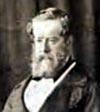
THE DUKE OF NEWCASTLE, (1811-1864), the fifth Duke—K.G., B.A., D.C.L., was M.P. for South Nottinghamshire fourteen years as Lord Lincoln. He was First Commissioner of Woods and Forests, 1841-1846. His opinions on the Corn Laws changed with those of Sir Robert Peel, and this change cost him his seat, for his father's influence was used against him, but being appointed Secretary for Ireland, he was elected for a Scotch constituency. Succeeding to the Dukedom in 1851, he became Secretary of State for the Colonies, and when the War with Russia broke out he was made Secretary for War. The country having had a long peace there was no preparedness for war, and an absence of proper control of contractors, who supplied goods which in many cases were fraudulent or defective. The Duke thereupon had to bear a torrent of abuse, his efforts for good having been thwarted. He was again Colonial Secretary in 1859, till his death. He was a man of ability and integrity. His trustees, Mr. Gladstone and Lord de Tabley, leased the Nottingham Castle to the Corporation.
CHARLES PAGET, Esq., (1799-1873), was a member of a distinguished Nottinghamshire and Leicester family. He was made a J.P. for Nottinghamshire in 1839, and was High Sheriff in 1844.
At Ruddington Grange, he organized a system of sending to Nottingham twice a day a large supply of milk, and although that was an ordinary business affair, yet it was then (when there was no supervision securing quality) a great benefit to have a regular supply of good milk. He was an educationalist before it was fashionable. He developed a system of half time for boys to work on his farm, and on alternate days they went to school, and he took William Spencer (who was a born teacher, although not a trained one) from Carrington to assist him in the mental training of young men and the lads in the village. He was elected M.P. for Nottingham in 1856, and thrice subsequently, and was a very useful member, bringing business capacity to bear upon improving the bills introduced to Parliament.
The election of 1865 was in many respects a remarkable one. In no election in Nottingham, before or after, had vile slander and personal intimidation, and the stirring up of the worst passions of the people of the baser sort, been used to such an extent against people of the most decent character, the consequence being riots of a very serious character, all stimulated from one source. Terrorism prevailed. The result of the election poll was: Mr. Samuel Morley 2393, Sir Robert Clifton 2352, Mr. Paget 2327, Mr. A. G. Martin 2242.
Mr. Paget actively supported the educational institutions of Nottingham, and the Art and University Extension classes, and was at the first School Board election placed second at the head of the poll, out of forty candidates.
On October 13th, 1873, he and Mrs. Paget, and her sister, Miss Tebbutt, staying at Filey, went and sat on the rocks near the Brigg, and there came a huge wave and broke over them, and swept Mr. and Mrs. Paget into the sea, and they were drowned.
THE CARNARVON (HERBERTS) FAMILY.
HENRY HOWARD MOLYNEUX HERBERT, fourth Earl of Carnarvon (1831-1890), P.C., D.C.L., LL.D., married the daughter of the sixth Earl of Chesterfield, Lady Evelyn Stanhope, who died in 1875. "He, as Secretary of State for the Colonies, conducted to a successful issue in 1867, the negotiations by which the Canadian Provinces, till then disunited and comparatively feeble, were consolidated into a powerful and conspicuously loyal unit of the Empire." He made many speeches on the subject, which were collected and published in 1902 by Sir Robert Herbert (Murray). His efforts to accomplish the like service for Africa were for the time being thwarted, but he abolished slavery on the Gold Coast. As Lord Lieutenant of Ireland, he tried to arrive at some understanding with Parnell, but they came to a battle royal. He married in 1878 his second wife, Elizabeth Catharine Howard, and they travelled extensively, both in the British Empire and elsewhere, for his view was that personal observation should precede legislation. On the death of Lady Chesterfield in 1885, the Nottinghamshire estates at Bingham, Shelford, Gedling, and elsewhere passed to the Earl of Carnarvon's eldest son, Lord Porchester, and one of the first acts of the Earl as guardian, and as Patron of the Gedling Church, and one of the last acts of Lord Forester, as Sector, was to arrange with the Ecclesiastical Commissioners for the sale of the Gedling Glebe farm to a Committee of working men, to be divided into 800 garden allotments, payable for by instalments over seven years, and that land is now called the Porchester Estate, at Mapperley.
GEORGE EDWARD STANHOPE MOLYNEUX HERBERT, fifth Earl of Carnarvon, (1866-1923), who succeeded to estates of about 30,000 acres, became a great traveller, and after a terrible motor accident resolved to devote himself to research as to the ancient history and antiquities of Egypt. In 1906, in association with Mr. Howard Carter, he applied to the Archaeological Committee at Cairo for permission to excavate at Thebes, and during the ensuing years many valuable discoveries were made by them. After the War, Lord Carnarvon was granted a concession in the Valley of the Tombs of the Kings, and in 1922 their sixteen years' patient work was rewarded by the discovery of the tomb of Tut-ankh-amen, with all its marvels. A few months after this brilliant success, however, Lord Carnarvon was bitten by a mosquito, with fatal results, and he said to a friend, "I have heard the call. I am preparing for it," and on April 6th, 1923, he passed away. His sister, Lady Winifred Burghclere, wrote the sketch of his life in Mr. Howard Carter's book, "The Tomb of Tut-ankh-amen." (Cassell).
AUBREY NIGEL HENRY MOLYNEUX HERBERT, (1880-1923), was second son of the fourth Earl of Carnarvon, and his coming of age was celebrated at Teversal Manor. After being educated at Oxford, he entered the Diplomatic service at Tokio, and later at Constantinople. He travelled extensively in Macedonia and Arabia, and learned the Turkish, Arabic and Greek languages, which were of great service later on. In some fighting between Turks and Albanians he was taken prisoner by the latter. In the Great War, through defective eyesight, being ineligible for service, he joined a Special Reserve as Interpreter, He was Second Lieutenant in the Irish Guards, and was wounded and taken prisoner in the retreat from Mons, but managed to escape. He went to Egypt as Captain of the General Staff, where his knowledge of Arabic was of material service. He was in the first landing in the Dardanelles, and later in Mesopotamia. He helped to negotiate the Armistice with the Turks, for which he was mentioned in despatches. He served in Salonica and Italy. The story is told in "Mons, Anzac and Kut," by an M.P.
He became M.P. for the Yeovil Division of Somerset, and for a time was Parliamentary Secretary to the Chief Secretary for Ireland.
He had a kindly, winning manner, and wherever he went he made friends.
ROBERT LOWE, (1811-1892), who became Viscount Sherbrooke, was born at Bingham Rectory, he being the second son of the Rev. R. Lowe, the first son succeeding to the Oxton estate, and taking the name of Sherbrooke. He was educated at Winchester and Oxford, where he graduated as B.A. in 1833, and became a tutor, and later a student at Lincoln's Inn, and was called to the bar. He went to Australia, and secured election to the Legislative Council of New South Wales, in which he advocated national education, and sought to remedy the transportation system, which was administered with shocking neglect and cruelty. Financially, he was very successful in buying and selling real estate, so that in 1850 he returned to England, where he became a writer for "The Times" newspaper, and was elected M.P. for Kidderminster. In 1859 he was Vice-President of the Council, and Minister of Education, his system of payment by results effecting great improvements, but involving hardships. When the University of London obtained representation he was elected its first M.P. He was appointed Chancellor of the Exchequer, but his proposed tax on matches was vigorously opposed. Later he became Home Secretary. On his retirement he was made Viscount Sherbrooke (1880).
He was an example of a man triumphing over difficulties, for he suffered greatly from defective eyesight, which gradually became worse. Yet he was a very energetic worker, and his speeches were greatly admired. The honours bestowed upon him by the Queen, (P.C. and G.C.B.) the Universities of Oxford and Edinburgh, the Royal Society, the British Museum, etc., indicated his scholarship, his ability, his services, his character, and the confidence and esteem in which he was held.
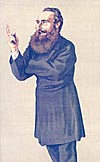
ANTHONY J. MUNDELLA, (1823-1897), was born at Leicester, his father being an Italian. After the usual education he became an assistant in a hosiery warehouse, and having been noticed by a Nottingham manufacturer for his attention to business and his capacity, at twenty-three he was offered a partnership, which resulted in the formation of a company, and the building of large works in Station Street, Nottingham. With the development of the business came other interests, and he became an active member of the Town Council, and a Captain of the Robin Hood Rifles. He strenuously promoted a system of arbitration and conciliation between employers and their workpeople. He became an M.P. for Sheffield, and so continued twenty-nine years. He was made a member of the Privy Council, and became its Vice-President. As Minister of Education he established Higher Grade Schools. As President of the Board of Trade he established the Labour Department. As Fellow of the Royal Society, he showed his interest in Science. The record on his tomb in the Nottingham Church Cemetery justly says: "Loving knowledge for its own sake, he strove to diffuse it among his countrymen. He laboured for industrial peace, and the welfare of the children of the poor."
JULIAN, BARON PAUNCEFOTE, of Preston, (1826 -1902), lawyer and diplomatist, who was of the Smith-Bromley family, became minister plenipotentiary to the United States, where he negotiated some very important matters. His funeral ceremonies at Washington were attended with great distinction. His body was brought in a U.S.A. man of war, and was buried at East Stoke, near Newark, where is a "Peace " monument, which was intended to represent the blessings of peace, a sermon in bronze, of international interest, because the deceased was the first representative from this country to be styled "Ambassador."
JOHN EDWARD ELLIS, (1841-1910), was born at the Newarks, Leicester, of a family whose members had in Yorkshire, distinguished themselves as churchwardens, and in Leicester, had become active members of the Society of Friends, and therefore advocates of liberty, temperance, and social welfare. After the usual education at Friends' schools, he was offered by his father, who was Chairman of the Midland Railway, the option of going to the University, or of travelling through the United States with a study of railway methods. He chose the latter. He was apprenticed to a firm of Bail-way Engineers at Leeds, and records his pride at assisting in the completion of a railway engine. In 1861 he went to Hucknall on his father's behalf, to take a joint charge of the colliery then being established, and there he made great efforts to accomplish parochial and social reform, in which he succeeded, a Local Board, and a School Board, being established, followed by a water supply, sewerage, widened streets, and other advantages, three sets of Board Schools being erected, and a Science and Art School, with the gift by the partners of a Free Library, and afterwards by Mrs. Ellis, of a Swimming Bath.
He became a member of the Nottingham School Board. He was for twenty-five years M.P. for the Rushcliffe Division, having six contested elections, each time with a different competitor, but he always had a substantial majority. He became Chairman of the House of Commons Committee of Ways and Means; and of the Standing Committee on Trade. He had the offer of the Speakership, which he declined. For a year he was Under-Secretary for India. He was a zealous advocate for peace, and the reduction of armaments. He vigorously opposed the South African War, and strongly supported Temperance, licensing reform, and Education. He accompanied, in 1909, a party of Bishops, representatives—clerical and lay—of the Roman Catholic and Nonconformist Churches, with several M.P.'s, on a visit to Germany, with a view to promote peace and goodwill between the two great Teutonic races. They were right royally received by the Kaiser and great dignitaries, and municipalities, and were assured of the peace of Europe, and the need for reducing the "terrible Navy estimates." In 1910 his illness came on, and he decided to resign, and a few days later he died.
Mrs. Maria Ellis, wife of the above, was daughter of John Rowntree. In 1866, Mr. Ellis went to Scarborough to recuperate after an illness, and there as he entered the Friends' Meeting House for worship, he caught sight of Miss Rowntree, and the thought immediately flashed through his mind, "My future wife." It may be the worship was that day divided or disturbed, but steps were of course taken to make the vision a reality, with happy lifelong results. (See "The Life of the Rt. Hon. John Edward Ellis, M.P." by A. T. Bassett).
J. E. Denison (Lord Ossington),
E. Denison,
W. T. Denison,
Scroope (Lord Howe),
R. Sutton (Lord Lexington),
T. Manners Sutton (Lord Manners),
J. H. T. Sutton (Lord Canterbury),
C. Manners Sutton,
Hon. Wm. Pierrepont,
Sir G. Savile,
H. Savile,
W. Savile,
Sir G. Savile,
Ed. Strutt (Lord Belper),
Hy. Strutt (Lord Belper),
H. J. Wilson,
See " Families."
